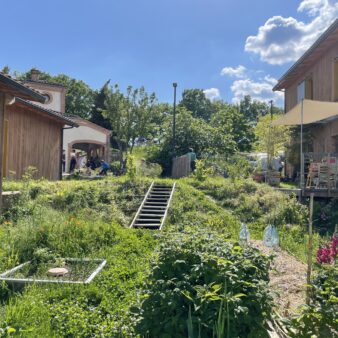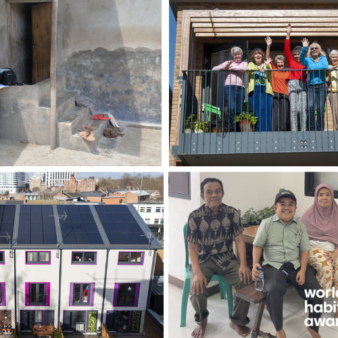
Tackling Homelessness with Housing-Led Programmes in Central & Eastern Europe
There is something very special about meeting your heroes.
Members of the World Habitat team and partners from our European End Street Homelessness Campaign from Central and Eastern Europe (CEE) experienced such a moment last month at the CRESCER conference on Housing First & Harm Reduction in Lisbon. We listened intently as Housing First founder, Sam Tsemberis, called for local champions to drive housing-led solutions to homelessness. As Tsemberis delivered his opening speech to heavy applause, there was no doubt that he and his model are widely celebrated in housing circles all over the world.
What is the Housing First model all about?
Developed in 1992, Housing First was an innovative and radical solution to homelessness, in that it moved the wider debate away from the individual towards the structural causes of homelessness (unemployment; exclusion from the housing market; and discrimination). The model prioritises access to permanent housing along with holistic, open-ended support services, with no conditions attached, except the willingness to sustain a tenancy.
Its three essential components include:
- Rent subsidy for rentals
- Community-based supports
- Programme philosophy based on recovery principles.
The spread of Housing First from its origins in the USA is remarkable: Tsemberis showed a map of replicated programmes across the world from Brazil to New Zealand, Australia to Canada, and also Western Europe. At World Habitat we have seen the success of the model first hand. Our homelessness partners CRESCER in Lisbon and Arrels Fundació in Barcelona operate in challenging housing markets and yet have over 100 Housing First units available to house people and families with complex needs.
Tsemberis provided the audience with a clear roadmap of how to scale-up Housing First to a city-wide housing approach, emphasising that above all, housing practitioners stay faithful to the core principles of the Housing First model. It was in that moment, the CEE members paused to reflect on the challenges of implementing such a model in their own contexts.
The day before, World Habitat convened eight members of the European End Street Homelessness Campaign for its annual gathering. Participants discussed their own housing-led programmes and shared potential solutions to each other’s challenges. Our CEE partners include organisations from Slovakia (STOPA Slovensko), Croatia (Hrvatska mreža za beskućnike (Croatian Network for the Homeless)), Romania (Carusel) and Hungary (Utcáról Lakásba! Egyesület /From Streets to Homes Association).
They discussed the challenges for Housing First and housing-led models in Central and Eastern Europe:
- The significant shortage of affordable housing and reliance on the public rented sector or cheaper private sector. With limited housing supply, it is hard to fulfil one of the key tenants of Housing First: no set time limit on tenancies.
- Demand for homelessness services far outweighs supply, so they must often provide services beyond Housing First’s target group of those with complex needs.
- Hostile government policies create barriers for fundraising and negatively influence public perceptions towards homelessness.
Rather than be defeated by these challenges, our partners in the region are working on transforming shelters to homes, by transitioning the traditional ‘staircase’ model to a housing-led one. Together we have identified some key institutional barriers and learnings which will help adapt the model to a new context. The ongoing advocacy work of the CEE network has led to housing-led solutions becoming a key policy route for some municipal authorities to tackle homelessness. From Streets to Homes Association in Hungary has significantly increased its housing portfolio through agreements with municipalities to provide flats for people experiencing homelessness and has intensively advocated for fundraising and volunteer recruitment in flat renovation.
Next year, the new ‘What About Me’ NGO in Croatia will deliver the country’s first Housing First project in the city of Pula, with funding and support from the municipality. The founders of the charity Helena Babic and Jana Milin Herceg are inspirational examples of how strategic and creative thinking, learning and sharing, and a huge amount of determination can take Housing First from ‘a good idea’ to a practical policy approach that has undeniable impact on reducing homelessness permanently.
Their learnings are key to inspiring and encouraging those in more challenging circumstances who have few case studies like their own experience in housing-led programming. Discussion, sharing and support is vital if we are to replicate housing-led models, including Housing First, far and wide.
Our CEE partners will continue to break down barriers, implement and develop their programmes, and come up with adaptations to make housing led approaches work for their contexts. Their expertise will help to refine the Housing First model for other contexts and show how it can be further replicated. And we in the housing sector, our beneficiaries and society at large, will be all the better for it.



Join the discussion